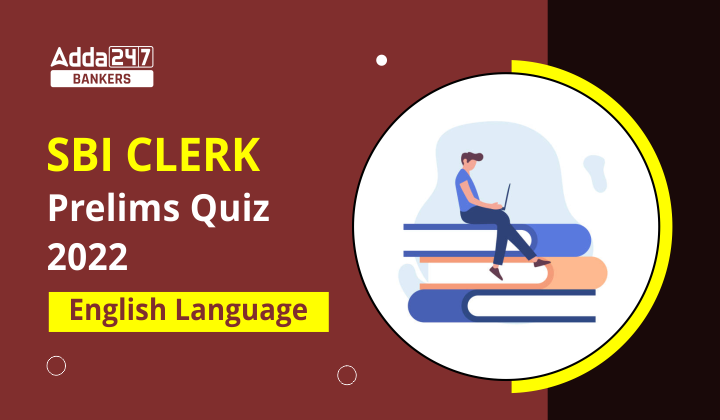Directions (1-15): Which of the following phrases given below each sentence should replace the phrase printed in bold letters to make the sentence meaningfully correct? Choose the best option among the five given alternatives that reflect the correct use of phrase in the context of the grammatically correct sentence. If the sentence is correct as it is, mark “No Change required” as your answer.
Q1. Potential electricity production had reduces by about 13% in the past 40 years.
(a) had reduce by about
(b) has reduced by about
(c) has reducing by about
(d) has reduces by about
(e) No change required
Q2. Increased warming in the Indian Ocean and the resultant weak of the Indian summer monsoon may come in the way of India’s goal of leading the world’s wind power generation.
(a) the resultant weakening off the
(b) the resultant weakening of them
(c) the resultant weakening of the
(d) them resultant weakening of the
(e) No change required
Q3. In the paper published last December in Science Advances, the researchers showed a decline in electricity production in the States of Rajasthan, Maharashtra, Gujarat, and Karnataka.
(a) showed an decline in
(b) showed a decline into
(c) showed a declining in
(d) showing an decline in
(e) No change required
Q4. Summer winds in India are driven by them temperature contrast between the Indian subcontinent and the Indian Ocean, and the warming in the Indian Ocean has reduced this contrast.
(a) are driven by the temperature
(b) are drive by the temperature
(c) are driven been the temperature
(d) are drives by the temperature
(e) No change required
Q5. Warming of the Equatorial Indian Ocean resulted the a decline in the wind speed.
(a) resulted in an decline in the
(b) resulted in a decline in the
(c) resulted into an decline in the
(d) resulted in a declining in the
(e) No change required
Q6. The Indian government has set a target off 60 GW of cumulative wind power capacity by 2022.
(a) has set a targets of
(b) has setting a target of
(c) hasn’t been set a target of
(d) has set a target of
(e) No change required
Q7. We know camera traps can help count tigers.
(a) knowing camera traps can
(b) knowingly camera traps can
(c) knows camera traps can
(d) know camera trapped can
(e) No change required
Q8. Northeast India is home too nine wild cats, including the ‘standard four’: the clouded leopard, Asiatic golden cat, marbled cat and leopard cat.
(a) is home to nine wild cat
(b) is was home too nine wild cats
(c) is homely too nine wild cats
(d) is home to nine wild cats
(e) No change required
Q9. The survival of the threatened bumphead parrotfish in the Andaman and Nicobar Islands hinges on of the persistence of coral reefs and presence of marine protected areas.
(a) hinges on the persistence of
(b) hinges on the persistence off
(c) hinges on them persistence of
(d) hinge on the persistence of
(e) No change required
Q10. For the first time, the blood biochemical parameters of Indian adolescents have be measured on a large scale and a normative range has been arrived at.
(a) have been measured on an
(b) have been measured on a
(c) have been measure on a
(d) have been measures on a
(e) No change required
Q11. Since biochemical parameters for Indian adolescents were not available, doctors had too rely on adult normative range.
(a) doctors had to rely on
(b) doctors had to rely on of
(c) doctors has too rely on
(d) doctor have to rely on
(e) No change required
Q12. The normative range for fasting plasma glucose for Indian adolescents was found to be slightly lower than Nigerians and Croatians.
(a) was found to be slight
(b) was found to been slightly
(c) was found too be slightly
(d) was find to be slightly
(e) No change required
Q13. For plasma insulin, the range of Indian adolescents were found too have more
(a) is less than Canadian adolescents.
(b) is less than or Canadian adolescents.
(c) is less than or less Canadian adolescents.
(d) is less than Canada adolescents.
(e) No change required
Q14. In a study, girls were found too have more insulin but less fasting glucose than boys.
(a) were found to has more
(b) was found to have more
(c) were find to have more
(d) were found to have more
(e) No change required
Q15. The higher insulin resistance in girls is due to the hormones released during puberty.
(a) in girls is due too the
(b) in girls is due to them
(c) into girls is due to the
(d) in girl is due to the
(e) No change required
Solutions
S1. Ans.(b)
Sol. Option ‘b’ is the correct choice here and makes the sentence contextually and grammatically correct. ‘Has reduced’ is correct here, ‘has’ will be used as the subject in the sentence is singular in nature.
S2. Ans.(c)
Sol. Option ‘c’ is the correct choice here and makes the sentence contextually and grammatically correct. ‘Weakening’ will be used in the sentence.
S3. Ans.(e)
Sol. No change required.
S4. Ans.(a)
Sol. Option ‘a’ is the correct choice here and makes the sentence contextually and grammatically correct. ‘Driven’ will be used in the sentence as the sentence is in passive voice.
S5. Ans.(b)
Sol. Option ‘b’ is the correct choice here and makes the sentence contextually and grammatically correct. The article ‘a’ will be used here as it is followed by ‘decline’.
S6. Ans.(d)
Sol. Option ‘d’ is the correct choice here and makes the sentence contextually and grammatically correct.
S7. Ans.(e)
Sol. No change required.
S8. Ans.(d)
Sol. Option ‘d’ is the correct choice here and makes the sentence contextually and grammatically correct. The preposition ‘to’ will be used in this sentence and not the adverb ‘too’ which means excessively.
S9. Ans.(a)
Sol. Option ‘a’ is the correct choice here and makes the sentence contextually and grammatically correct.
S10. Ans.(b)
Sol. Option ‘b’ is the correct choice here and makes the sentence contextually and grammatically correct.
S11. Ans.(a)
Sol. Option ‘a’ is the correct choice here and makes the sentence contextually and grammatically correct. The preposition ‘to’ will be used in this sentence and not the adverb ‘too’ which means excessively.
S12. Ans.(e)
Sol. No change required.
S13. Ans.(a)
Sol. Option ‘a’ is the correct choice here and makes the sentence contextually and grammatically correct. Since in this sentence we are referring to ethnicity of the people, we will say ‘Canadian’ and not ‘Canada’.
S14. Ans.(d)
Sol. Option ‘d’ is the correct choice here and makes the sentence contextually and grammatically correct. The preposition ‘to’ will be used in this sentence and not the adverb ‘too’ which means excessively.
S15. Ans.(e)
Sol. No change required.



 General Awareness Quiz for Bank Mains Ex...
General Awareness Quiz for Bank Mains Ex...
 English Language Quiz For Bank Foundatio...
English Language Quiz For Bank Foundatio...
 Reasoning Quiz For Bank Foundation 2024 ...
Reasoning Quiz For Bank Foundation 2024 ...







